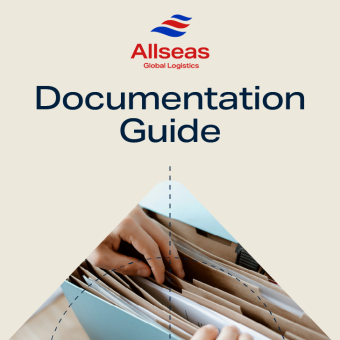Reference Guides
Documentation Guide
There are a wide variety of documents involved in the shipping process. So we’ve made things a little easier by creating this shipping documentation glossary which includes many of the different types of documents you’ll need to read, sign and send whenever you’re sending goods or requesting payments to various countries around the globe.
Listed below are the definitions of some of the documents you need to know about.
Bill of Lading
A bill of lading is a receipt, issued by the carrier once your cargo has been loaded onto a vessel. This receipt can be used as proof of shipment for customs and insurance. Or, it can act as commercial proof that a contractual obligation has been completed – especially under Incoterms such as CFR and FOB. The bill of lading itself details a shipment of merchandise, including the title of the goods. Once the carrier issues you with this document, they’re required to deliver the cargo to the appropriate party.
Certificate of Origin
A certificate of origin helps to establish:
- Whether your product is entitled to preferential duties in the importing country
- Your goods do not come from a nation which the importing country has placed trade restrictions against
The certificate of origin must be certified and/or legalised by the relevant country’s Embassy and Chamber of Commerce. As a member of both institutes, we can complete the document for you and have it stamped on your behalf. We can even issue the Euro and Arab Certificates of Origin.
EUR1 and EUR-MED movement certificate
Use these forms to either claim preferential duty rates on goods exported to countries that have a preferential trading agreement with the EU or record preferential trade in goods between the UK and participating countries. The document needs to be stamped by the customs office in question and must be accompanied by original, signed commercial invoices. As part of our comprehensive service, we can act on your behalf, getting all your EUR1 and EUR-MED documents signed and stamped at HM customs.
ATR
A movement certificate specifically for trade between Turkey and the EU/UK.
ECTN/BESC (Cargo Tracking Note)
Often needed when shipping to most West Africa countries, Cargo Tracking Notes are essential when shipping to the Republic of Congo, Cameroon, Benin and Togo. But don’t worry. If you’re not sure where to start, or don’t want the hassle, we can arrange them on your behalf.
ATR
A movement certificate specifically for trade between Turkey and the EC.
Seawaybill
A transport document that does not need surrendering in order to get delivery.
Airwaybill
A transport document that does not need surrendering in order to get delivery.
Booking Confirmation
Confirms your transport is arranged, offering collection points times and vessel details. This document should always be carefully checked immediately, as all shipping lines now charge if alterations are not notified within 24/48 hours (lines differ) of load time.
Customs Entries
Customs entries are completed online via the Customs Declaration Service (CDS). CDS is used for Import and Export declarations, by all modes of transport. Whilst the system itself produces no forms/documents, software designers have collaborated to produce standard print-outs which can be shared with importers/exporters, which can detail entry numbers, status, values declared etc.
End User Certificate
A letter from customs confirming the consignee is approved to take goods from the UK. This certificate is usually only required when shipping arms or similar. It may also be requested if your customer is a known supplier to armed forces.
T2L
A T2L (or a “movement certificate for goods with preferential origin status”) is a document that confirms that goods being shipped within the European Union (EU) are of preferential origin and thus qualify for preferential treatment under certain trade agreements. Goods travelling on a T2L or a T2L (F) form must be declared electronically on the EU Proof of Union Status (POUS) system.
Carnet
International customs and temporary export-import document. It’s used to clear customs in 87 countries/territories without paying duties/import taxes on merchandise that will be re-exported within a specified time. Referred to as a passport for cargo.
Letter of Credit
Letter issued by a bank to another bank (especially one in a different country) to serve as a guarantee for payments made to a specified person under specified conditions.
Export Licence
A government document that authorises the export of specific goods in specific quantities to a particular destination.
Dangerous Goods Certificate
Exports submitted for handling by air carriers and air freight forwarders classified as dangerous goods need to be accompanied by the shipper’s declaration for dangerous goods required for the international air transport association (IATA). The exporter is responsible for the accuracy of the form, ensuring that requirements related to packaging, marking, and other required information by IATA have been met.
Advance Manifest Filing (AMS) and ISF for United States Cargo and ACI for Canadian cargo
AMS/ACI and ISF documents are mandatory when moving USA-bound cargo. They’re basically a form of electronic pre-arrival information sent to US and Canadian ports. We don’t just have the ability to file AMS/ ACI and ISF on your behalf. We offer great range of advice on imports and exports to destinations that enforce countless, complex rules and restrictions.
Contact Allseas for more information
If you have questions about any of the above documents, simply get in touch with the Allseas team today on +44 (0)330 555 5555. We’d be more than happy to help in any way we can.

